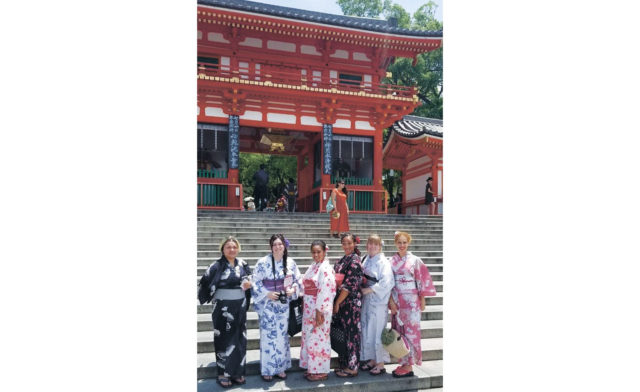
by Robert Lowery, Central Washington University (retrieved from CWU press release)
It’s generally acknowledged the best way to learn about another culture is to become part of it, at least for a time. That’s what nine Central Washington University (CWU) students discovered during a two-week stay in Japan this summer.
The students, enrolled in a junior-level communications studies course (Com 302), were studying ways to improve communication with people from other nations and cultures.
Communications professor Josh Nelson-Ichido led this summer’s six-week session, which included the trip to Japan. He says education abroad is important to overcoming a pervading avoidance—even subconsciously—of other cultures in students’ daily lives.
“This is why I always require some kind of interaction with another culture in my classes. So, the opportunity to do a special section of my Com 302 class really was a dream come true,” Nelson-Ichido said. While in Japan, the students visited the cities of Tokyo, Kyoto, and Hiroshima. “When designing this program, I immediately wanted to include Tokyo as a stop,” Nelson-Ichido explained. “Not only was it the location of our partner university [Asia University] but it’s also one of the biggest cities in the world and very different from anything the students would experience in the Pacific Northwest. Being the historical and cultural heart of the country, Kyoto offered an entirely different take on Japanese culture. Considering the focus of the class, Hiroshima was, arguably, the most important part of the trip.”
Coco Crawford, from Roy, was among the participants. She has served as an International Peer Advisor (IPA) with the Asia University America Program (AUAP). This was her fourth trip to Japan but her first as part of an organized group. “I thought I would get a different experience and perspective if I went with other Americans,” Crawford explained about her reason for going on the education abroad program. “For everyone else, it was their first time going [to Japan]. Instead of being the one led around, I got to lead and teach them from what I had learned about the culture, phrases I know, and recommend restaurants. It was so fun for me.”
In Tokyo, the group was hosted by CWU’s partner institution Asia University. The CWU students interacted with faculty, staff, and students, and learned about Japanese academic and classroom culture. Previous academic and personal connections with AUAP in Ellensburg enhanced the CWU students’ experience in Japan, particularly during the visit to Asia University.
In Kyoto, the CWU students visited several important cultural sites, learned about Japanese office culture—and took a side trip to an area known for its matcha tea production.
In Hiroshima, the group visited the Peace Memorial Park, which recounts the 1945 atomic bombing of that city during World War II. It was Crawford’s first visit to that site.
“It was really life changing for me, because what we learned about the events in school [in the US] was different from what I learned there,” acknowledged Crawford. “They don’t place blame. It’s about the experience of what happened and learning how not to repeat the history. It still affects me when I think or talk about it.”
While in Hiroshima, the students also saw the Itsukushima Shrine and torii gate, which are listed among Japan’s most revered sites. At high tide, the ancient Shinto shrine seems to float on the sea, while at low tide, the students got to see it up close.
Crawford, who is an elementary education major, plans to utilize what she learned on the trip when she enters the workforce next year.
“I plan to move to Japan next spring to teach English,” she points out. “I think that being able to show that I went on this intercultural communications trip to learn more about Japan will help when I start applying for jobs there.”






